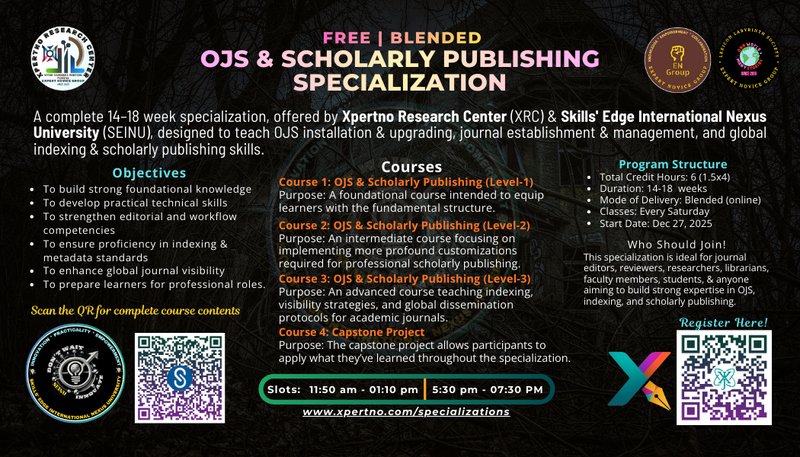OJS & Scholarly Publishing Specialization

The OJS & Scholarly Publishing Specialization, offered by Xpertno Research Center (XRC) & Skills' Edge International Nexus University (SEINU), is a detailed program made up of several courses that helps researchers, editors, librarians, and academic professionals learn the skills needed to create, run, improve, and share high-quality scholarly journals worldwide. This specialization lasts 14 to 18 weeks and offers practical training using Open Journal Systems (OJS), current metadata standards, indexing systems, and worldwide ethical guidelines.
The program combines basic publishing knowledge with advanced system management, helping participants gain practical skills in starting and managing a journal, improving workflows, optimizing metadata, and using indexing services like Google Scholar, WoS, DOAJ, and Scopus to increase global visibility. By the end of the track, graduates will be able to set up, run, upgrade, and transform a scholarly journal into an internationally compliant publication using industry-standard tools and protocols.

Conceptualized, Designed, & Curated By
Nasir Razzaq (Public Name: Raja Nasir)
Ph.D. Linguistics Scholar | Author | Philosopher | Interdisciplinary Researcher
Director & CEO, Expert Novice Group
rajanasir.razzaq@xijir.com | rajasunny.razzaq@gmail.com
Objectives
- To build strong foundational knowledge
- To develop practical technical skills
- To strengthen editorial and workflow competencies
- To ensure proficiency in indexing & metadata standards
- To enhance global journal visibility
- To prepare learners for professional roles.
Outcomes
By successfully completing all three courses, participants will be able to:
- Establish a new scholarly journal using global best practices.
- Install, configure, and deploy OJS on a live server environment.
- Upgrade OJS versions, migrate journals, and troubleshoot system issues.
- Customize themes, workflows, and plugins to match editorial requirements.
- Design and optimize full editorial workflows from submission to publication.
- Index journals easily.
- Implement SEO, URL strategy, and visibility frameworks to enhance readership.
- Apply international ethical guidelines, transparency standards, and ICAP policies.
- Manage journals independently as a journal manager or OJS administrator.
- Provide consultancy, training, and technical assistance to academic institutions.
Course Descriptions
Course 1: OJS & Scholarly Publishing (Level-1)
Purpose: A foundational course intended to equip learners with the fundamental structure, installation workflows, and scholarly publishing essentials required to establish and run an academic journal.
Credit Hours: 1.5
Modules
Module 1: Foundations of Scholarly Publishing & Journal Establishment
- Understanding scholarly communication
- Anatomy of an academic journal
- Editorial structure & roles
- Ethical frameworks (COPE basics)
- Pre-launch checklist for new journals
Module 2: OJS Installation & Server Environment
- System requirements (PHP, MariaDB/MySQL, Apache/Nginx)
- CPanel vs manual installation
- Config.inc.php structure
- SMTP emails, Cron jobs, file permissions
- Backup, restoration & server stability
Module 3: Web Structure, URL Strategy & Basic SEO
- Subdomains vs directories
- URL mapping & journal naming strategy
- Theme fundamentals
- Metadata basics & SEO foundations (journal-level)
Assessment
- Install & configure a demo journal on a subdomain
- Short reflective task on journal establishment
Course 2: OJS & Scholarly Publishing (Level-2)
Purpose: An intermediate course focusing on upgrading OJS systems, migrating journals, and implementing more profound customizations required for professional scholarly publishing.
Credit Hours: 1.5
Modules
Module 1: OJS Upgrade & System Migration
- OJS 2 → OJS 3 migration workflow
- Latest-version upgrades
- Database handling, issues & debugging
- Plugin compatibility and safety protocols
Module 2: Deep Customization & Workflow Engineering
- Editorial workflow configuration
- Custom theme editing
- Advanced plugin ecosystem
- Submission → Review → Copyediting → Production → Publication model
- Troubleshooting, error logs, and debugging techniques
Assessment
- Upgrade an old OJS journal to a newer version
- Submit technical report: “Challenges, Solutions & Migration Map”
Course 3: OJS & Scholarly Publishing (Level-3)
Purpose: An advanced, outcome-driven course teaching indexing, visibility strategies, metadata mastery, and global dissemination protocols for academic journals.
Credit Hours: 1.5
Modules
Module 1: Search Engine Indexing & Metadata Standards
- Google/Bing
- XML vs Crossref vs SEIPID metadata
- ORCID integration
- SEO for scholarly journals
Module 2: Journal Engine Indexing & Visibility Frameworks
- Google Scholar indexing
- DOAJ criteria & compliance
- Dimensions, RCSI, WOS alternatives
- Scopus criteria & compliance
- Crossref DOI workflows
- XML imports/exports
Module 3: Visibility, Impact & Global Dissemination
- Building international reviewer/editorial networks
- Building international authorship
- Social media visibility
- Academic web presence strategy
- Global readership building
Module 4: ICAP Policies & Publication Ethics
- Ethical publishing standards
- Policy compliance
- Best practices for transparency & long-term indexing
Assessment
- Create a complete metadata sheet
- Prepare a full mock DOAJ/WoS/Scopus application
- Submit an Indexing & Visibility Strategy for a journal
Course 4: Capstone Project
- Description: The capstone project allows participants to apply what they’ve learned throughout the specialization. Participants will work on a real-world project that integrates skills from all courses.
- Credit Hours: 1.5
Program Structure:
- Total Credit Hours: 6
- Duration: Minimum 14 weeks, maximum 18
- Mode of Delivery: Blended (mostly online)
- Classes: Every Saturday/Sunday (Noon and Evening)
- Start Date: Dec 27, 2025
- Seats: 60 (Max)
Course Syllabus and Content Update
Our course syllabi and contents have been published. The finalized syllabi are available now. We encourage interested candidates to apply in advance by visiting XRC or scanning the QR code.

Who Should Join!
This specialization is ideal for all professionals, students, teachers, recent graduates, and anyone looking to enhance their skills in this field.